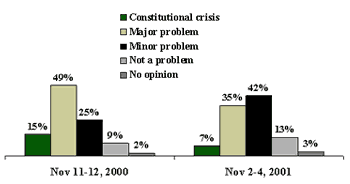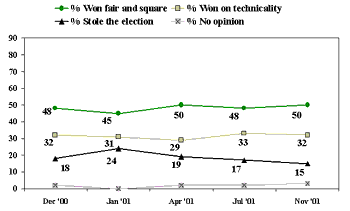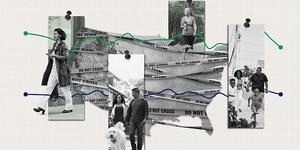GALLUP NEWS SERVICE
PRINCETON, NJ -- It's been a year since the 2000 presidential election, and the controversy over which candidate, Al Gore or George W. Bush, actually won Florida and hence the election. In the interim, of course, the country has undergone a transforming experience with the terrorist attacks in New York City and Washington, D.C. Thus it is not surprising that today Americans see the controversy as far less of a problem than they did a year ago. Today, 42% say the events of that time represented either a constitutional crisis or a major problem, while 55% say it was either a minor problem or no problem at all. A year ago, however, the majority leaned the other way, with 64% saying the events constituted a major problem or worse, and only 34% indicating it was a minor problem or less.
| Which of these statements do you think best describes the situation that occurred as a result of the 2000 presidential election last year? |
 |
These more positive views are also reflected in the public's assessment of the electoral system. The current poll shows that 41% of Americans have "quite a lot" or a "great deal" of confidence in the electoral system (the way votes are cast and counted), while just 26% have "very little" or none. Last year, the margins were reversed, with only 30% giving the high rating and 37% the lower rating.
Similarly, this year 43% of Americans believe the electoral system needs major reforms or a complete overhaul, while 54% believe minor reforms or no reforms would suffice. Last year, the majorities were reversed -- 67% called for major reforms or more, and just 31% said minor reforms or less were acceptable. These more positive views are also found in the public's assessment of how fair the electoral system is. Overall, 61% of Americans believe it is fair to all Americans, while 37% say it is not, an improvement over the 52% to 44% margin of a year ago.
Despite their changed view about the seriousness of the election controversy and the need for change in the electoral system, Americans have not changed their minds about what happened in the election and its aftermath. The poll shows that today 50% of Americans say Bush won the presidency fair and square, while 32% say he won it on a technicality, and 15% say he stole the election. These numbers are little changed from those found immediately after the Supreme Court decision in December that effectively halted the vote recount and made Bush the winner. At that time, 48% said Bush won fair and square, 32% said he won on a technicality, and 18% said he stole the election. These results are also remarkably similar to those obtained in a Gallup poll this past July.
| Which comes closest to your view of the way George W. Bush won the 2000 presidential election? |
 |
Americans Strongly Support Bush for '04; Divided on
Congressional Election One Year Away
While much can happen in the next three years, registered voters say that if the presidential election of 2004 were held today, they would re-elect Bush by a major landslide, 60% to 36%. Last August, the hypothetical race showed a virtual tie, with 49% of registered voters supporting Bush and 48% for Gore. While these numbers should not be interpreted as predicting the outcome of the next presidential election, they are indicative of how fundamentally changed is the political landscape.
A major factor in the shift toward Bush has been the public's view of his response to the terrorist attacks. Public approval for Bush's handling of the war has been at or above 90% for the last several weeks, and his general job approval score has been almost as high. In addition, by 41% to 12%, Americans say that, compared with Bush, Gore would have done a worse job rather than a better job in dealing with terrorism. Another 40% say Gore would have done as well as Bush.
On the economy, Americans remain evenly divided over which of the two men would have done a better job. While 39% say Gore would have done about the same as Bush, 28% say Gore would have done worse and 26% say better.
This equality in evaluation on the economy comes despite a 71% approval rating for Bush on handling the issue. The new rating is little changed from last month, but 17 points higher than the rating in July, the last such measure before the terrorist attacks.
The poll also shows that Americans are evenly divided on which party's congressional candidates they are most likely to support in the election next year. If the election were held today, 45% of registered voters would support the Republicans and 45% would support the Democrats, while 10% are unsure. Last June, the Democrats had a slight advantage of 49% to 45%.
Survey Methods
The results reported here are based on telephone interviews with a randomly selected sample of 1,012 adults across the 48 contiguous states, aged 18+, conducted Nov. 2-4, 2001. For results based on the total sample of national adults, one can say with 95% confidence that the margin of sampling error is +/- 3 percentage points. In addition to sampling error, question wording and practical difficulties in conducting surveys can introduce error or bias into the findings of public opinion polls.
If the elections for Congress were being held today, which party's candidate would you vote for in your congressional district -- [ROTATE: 1) The Democratic Party's candidate or 2) The Republican Party's candidate]?
As of today, do you lean more toward -- [ROTATE: 1) The Democratic Party's candidate or 2) The Republican Party's candidate]?
|
Democratic |
Republican |
Undecided/ |
|
|
National adults |
|||
|
(NA) 2001 Nov 2-4 |
43% |
44 |
13 |
|
(NA) 2001 Jun 8-10 |
50% |
43 |
7 |
|
Registered voters |
|||
|
(RV) 2001 Nov 2-4 |
45% |
45 |
10 |
|
(RV) 2001 Jun 8-10 |
49% |
45 |
6 |
How much confidence do you have the system in which votes are cast and counted in this country -- a great deal, quite a lot, some, or very little?
|
A great deal |
Quite |
|
Very |
NONE (vol.) |
No |
|
|
2001 Nov 2-4 |
21% |
20 |
32 |
25 |
1 |
1 |
|
2000 Dec 15-17 |
15% |
15 |
32 |
35 |
2 |
1 |
In general, do you think the system in which votes are cast and counted in this country -- [ROTATED: discriminates against some people, (or) is fair to all Americans]?
|
Discriminates |
Is fair to |
No |
|
|
2001 Nov 2-4 |
37% |
61 |
2 |
|
2000 Dec 15-17 |
44% |
52 |
4 |
Do you think the system in which votes are cast and counted in this country is in need of -- [ROTATED: a complete overhaul, major reforms, minor reforms, (or) no reforms]?
|
Complete overhaul |
Major |
Minor |
No |
No |
|
|
2001 Nov 2-4 |
19% |
24 |
45 |
9 |
3 |
|
2000 Dec 15-17 |
28% |
39 |
27 |
4 |
2 |
Thinking about the 2000 election for president involving George W. Bush and Al Gore,
Which comes closest to your view of the way George W. Bush won the 2000 presidential election -- [ROTATED: he won fair and square, he won, but only on a technicality, (or) he stole the election]?
|
Won fair |
Won on |
Stole |
No |
||
|
% |
% |
% |
% |
||
|
2001 Nov 2-4 |
50 |
32 |
15 |
3 |
|
|
2001 Jul 10-11 |
48 |
33 |
17 |
2 |
|
|
2001 Apr 20-22 ^ |
50 |
29 |
19 |
2 |
|
|
2001 Jan 15-16 ^ † |
45 |
31 |
24 |
* |
|
|
2000 Dec 15-17 † |
48 |
32 |
18 |
2 |
|
|
^ |
Based on half sample. |
||||
|
† |
WORDING: Which comes closest to your view of the way George W. Bush won the election -- [ROTATED: he won fair and square, he won, but only on a technicality, (or) he stole the election]? |
||||
Which of these statements do you think best describes the situation that occurred as a result of the 2000 presidential election last year -- [ROTATED: it was a constitutional crisis, it was a major problem for the country but was not a crisis, it was a minor problem for the country, (or) it was not a problem for the country at all]?
|
Constitutional crisis |
Major problem |
Minor problem |
Not a |
No |
||
|
% |
% |
% |
% |
% |
||
|
2001 Nov 2-4 |
7 |
35 |
42 |
13 |
3 |
|
|
2000 Dec 10 ^ |
17 |
46 |
25 |
9 |
3 |
|
|
2000 Nov 26-27 ^ |
10 |
50 |
29 |
9 |
2 |
|
|
2000 Nov 19 ^ |
10 |
44 |
32 |
12 |
2 |
|
|
2000 Nov 11-12 † |
15 |
49 |
25 |
9 |
2 |
|
|
^ |
WORDING: Which of these statements do you think best describes the situation that has occurred since the election for president -- [ROTATED: it is a constitutional crisis, it is a major problem for the country but is not a crisis, it is a minor problem for the country, (or) it is not a problem for the country at all]? |
|||||
|
† |
WORDING: Which of these statements do you think best describes the situation that has occurred since Tuesday's election for president -- [ROTATED: it is a constitutional crisis, it is a major problem for the country but is not a crisis, it is a minor problem for the country, (or) it is not a problem for the country at all]? |
|||||
Q.36/Q.37 SPLIT SAMPLED
36. If Al Gore had been elected president in 2000, do you think he would have done -- [ROTATED: a better job, about the same job, or a worse job] -- than George W. Bush has done in responding to the terrorist attacks?
BASED ON -- 468 -- NATIONAL ADULTS IN FORM A; ±5 PCT. PTS.
|
A better job |
About the same |
A worse job |
No opinion |
|
|
2001 Nov 2-4 |
12% |
40 |
41 |
7 |
|
2001 Oct 5-6 |
9% |
46 |
40 |
5 |
37. If Bill Clinton were still president, do you think he would have done -- [ROTATED: a better job, about the same job, or a worse job] -- than George W. Bush has done in responding to the terrorist attacks?
BASED ON -- 544 -- NATIONAL ADULTS IN FORM B; ±5 PCT. PTS.
|
A better job |
About the same |
A worse job |
No opinion |
|
|
2001 Nov 2-4 |
16% |
34 |
44 |
6 |
Q.38/Q.39 SPLIT SAMPLED
38. If Al Gore had been elected president in 2000, do you think he would have done -- -- [ROTATED: a better job, about the same job, or a worse job] -- than George W. Bush has done in dealing with the economy?
BASED ON -- 468 -- NATIONAL ADULTS IN FORM A; ±5 PCT. PTS.
|
A better job |
About the same |
A worse job |
No opinion |
|
|
2001 Nov 2-4 |
26% |
39 |
28 |
7 |
39. If Bill Clinton were still president, do you think he would have done -- -- [ROTATED: a better job, about the same job, or a worse job] -- than George W. Bush has done in handling the economy?
BASED ON -- 544 -- NATIONAL ADULTS IN FORM B; ±5 PCT. PTS.
|
A better job |
About the same |
A worse job |
No opinion |
|
|
2001 Nov 2-4 |
33% |
35 |
29 |
3 |
Suppose that the presidential election were being held today, and it included George W. Bush as the Republican candidate and Al Gore as the Democratic candidate. Would you vote for -- [ROTATED: George W. Bush, the Republican (or) Al Gore, the Democrat]?
As of today do you lean toward Bush, the Republican, or Gore, the Democrat?
|
Bush |
Gore |
OTHER (vol.) |
No opinion |
|
|
National Adults |
||||
|
(NA) 2001 Nov 2-4 |
61% |
35 |
2 |
2 |
|
(NA) 2001 Aug 3-5 |
48% |
48 |
1 |
3 |
|
Registered Voters |
||||
|
(RV) 2001 Nov 2-4 |
60% |
36 |
2 |
2 |
|
(RV) 2001 Aug 3-5 |
49% |
48 |
* |
3 |
* -- Less than 0.5%
(vol.) – Volunteered response
